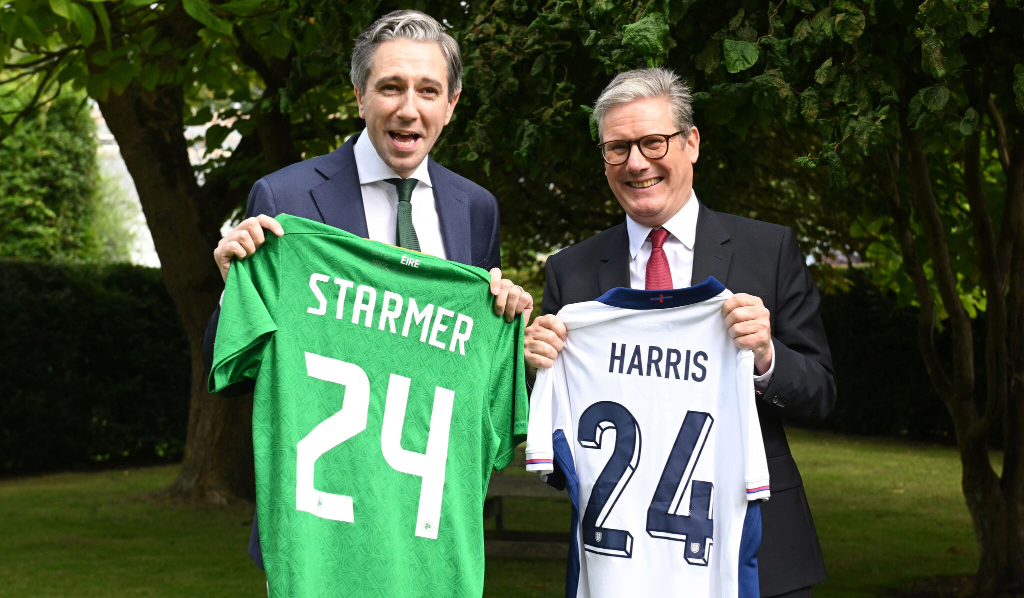SO, Irish-British relations are restored to some sort of balance after the turbulence caused by Brexit then Boris.
That was the impression Taoiseach Simon Harris and Prime Minister Keir Starmer were at pains to give recently in a carefully choreographed encounter, swapping football jerseys at their bilateral meeting ahead of the Ireland-England football game.
They were the very definition of amity and accord.
And there is a fair bit to smooth over.
There have been bumps in the road a-plenty over the past eight years, since Britain voted to leave the European Union, opening-up all manner of unforeseen (and quite a few foreseen) consequences.
The chauvinistic attitude from British ministers towards Ireland was perfectly summed-up by the ill-considered remarks of Tory cabinet minister, Priti Patel, who suggested that Britain could put pressure on Brussels by ceasing to act as a land bridge to Ireland, thus cutting off food supplies.
(Mercifully, Patel was the first candidate to be ejected from the current Conservative leadership contest).
Perhaps it’s little surprise that momentum in Northern Ireland petered-out in recent years with both governments – co-guarantors of the Good Friday Agreement – at loggerheads for so long.
 British Prime Minister Keir Starmer and Taoiseach Simon Harris exchanged football shirts ahead of the recent Nations League match between Ireland and England
British Prime Minister Keir Starmer and Taoiseach Simon Harris exchanged football shirts ahead of the recent Nations League match between Ireland and EnglandSo, the photo opportunity and carefully rehearsed bonhomie between Harris and Starmer is more than just a diplomatic nicety, it’s an attempt to repair the real damage caused by the previous Conservative government.
And worth pointing out that the problem was not just caused by Brexit.
David Cameron had little interest in Northern Irish affairs and insisted on despatching a series of underwhelming ministers to Belfast throughout his premiership.
Who can forget the hapless Karen Bradley, who freely admitted in an interview that she ‘didn’t understand’ that ‘people who are nationalists don’t vote for unionist parties and vice versa’.
At the very least, Starmer’s appointment as secretary of state, Hilary Benn, cannot possibly be any worse.
Indeed Benn, a veteran of the Blair and Brown cabinets, may prove an inspired choice in helping get things back on an even keel.
Although not sharing his father Tony’s radical politics, Benn the Younger is politically feline and very much a listener.
He will need to be as there are a still a series of tricky issues to deal with.
The ongoing problem of cross-border migration into the Irish state from the North, will start to put pressure on the viability of the century-old Common Travel Area agreement between Ireland and Britain.
It’s a mark of the Conservatives’ disregard for Ireland that some of their MPs thought it was Ireland’s just desserts for insisting on an open border as the price of a Brexit deal with the EU.
There’s also the issue of the Conservatives’ unilateral decision to legislate to curtail further investigations into Troubles-era killings, particularly those committed by British soldiers.
Dublin was pursuing an international grievance against the British government, but Labour has pledged to repeal the Act, although it is still unclear how they will approach contentious future prosecutions.
Further down the road is the issue of Irish unity, which will loom into view in the next few years, probably on the other side of a British general election in 2029.
It’s unlikely Benn (and possibly even Starmer) will still be around for that, but what is said (or even unsaid) over the next few years on that subject will be carefully pored over.
And even though Ireland got a two-nil thumping in the football, it’s a small price to pay for having adults back running the British government.

